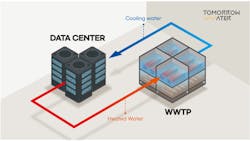Tomorrow Water partners with Samsung on Co-Flow initiative
Tomorrow Water and its parent company, BKT, have signed a memorandum of understanding in Korea with Samsung, Dohwa Engineering, and BNZ Partners to develop eco-friendly integrated datacenter and sanitation infrastructure solutions.
This new collaborative partnership comes on the heels of Tomorrow Water’s partnership with Arcadis, a global design and consultancy firm who is conducting the techno economic evaluation of the process and will develop the first Co-Flow projects in the U.S with Tomorrow Water.
Co-Flow integrates a wastewater treatment facility and a data center on a single plot of land, linking the energy and fluid streams of both facilities to improve sustainability and economics. Process intensification coupled with an innovative water-cooling concept results in compact footprints, reduced potable water use, energy and life cycle costs while creating a highly attractive and sustainable solution for data centers especially in water stressed areas.
The use of Tomorrow Water’s technologies enables these data centers to be built on top of underground wastewater treatment processes, further reducing footprint in direct response to land scarcity challenges resulting from rapid urbanization over recent decades.
Co-Flow was developed as part of the company's broader Tomorrow Water Project, an initiative to co-locate and interconnect infrastructure elements such as wastewater treatment, renewable energy generation, and data center capacity — capitalizing on their complementary energy, heat, nutrient, and water inputs and outputs to make them more sustainable and affordable to the global population.
In 2018, BKT replaced and modernized the wastewater treatment facility at the Jungnang Water Recycling Center in Seoul. BKT’s revolutionary Proteus primary wastewater treatment technology reduced the plant’s total footprint by 60 percent (reducing the primary sedimentation footprint alone by 85 percent) which turned a once fenced in industrial facility into a community asset.
Demand for data centers exacerbated the lack of useable sites for data center construction in urban centers. Given the fact that municipal governments around the world have been moving to upgrade or replace their sewage treatment infrastructure, Co-Flow could mean a win-win scenario for data center development companies, local governments, and their constituents.
